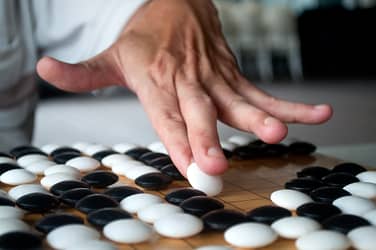Go (from igo / 囲碁) is an ancient board game which utilizes simple elements – line and circle, black and white, stone and wood – and combines them with simple rules which generate subtleties that have enthralled players for millennia.
Come learn the intricacies of Go with Peter Freedman, named American Go Foundation Teacher of the Year. Peter will discuss the origins of the game, its place in Japanese history, culture and art, and why he believes Go is the best game ever invented. Watch a game in action, while Peter discusses the strategy of the moves, and then try your hand at playing the game of Go.
There will be two presentations on Sunday; one beginning at noon and another starting at 1:00pm

Go’s few rules can be demonstrated quickly and grasped easily. The game is enjoyed by players of different skill levels utilizing a unique handicapping system that allows for an equal contest. A typical game retains a fluidity and dynamism not found in other board games. An early mistake can be made up and there is no simple strategy to lead to a clear victory. The game rewards patience and balance over aggression and greed. Go strategy is more lateral than linear, less dependent on logical thinking and more reliant on a “feel” for the stones.
Go is more than a game, as many players see it as an analogy for life, an exercise in abstract thinking, or a beautiful art in which black and white dance in a delicate balance across the board.
About Peter Freedman
Peter Freedman, of Portland, OR, has been named the AGF Teacher of the Year, winning a free trip to the US GO Congress in NYC. Freedman, who has been active in the Portland area for decades, has focused his primary activities on youth Go in recent years. Freedman and Fritz Balwit (2011 AGF Teacher of the Year) had tried to establish Go clubs in schools for many years, but they were short-lived and drew minimal numbers. “I approached several school chess coaches about the idea of morphing their programs into chess and go clubs, and now there are over 100 children in these clubs, spread over five schools, I teach Go and Fritz teaches chess in most schools,” Freedman told the Journal. “The students can play only chess; play only Go; or, switch between chess and Go each month. New students must play a month of Go before they decide on their option. There is a segment of our culture that knows, appreciates and respects chess, while only a few know of Go. Yet, many of us were chess players before we were Go players. It seems like a nice path. We need a new motto: chess is our friend, not our enemy.”
